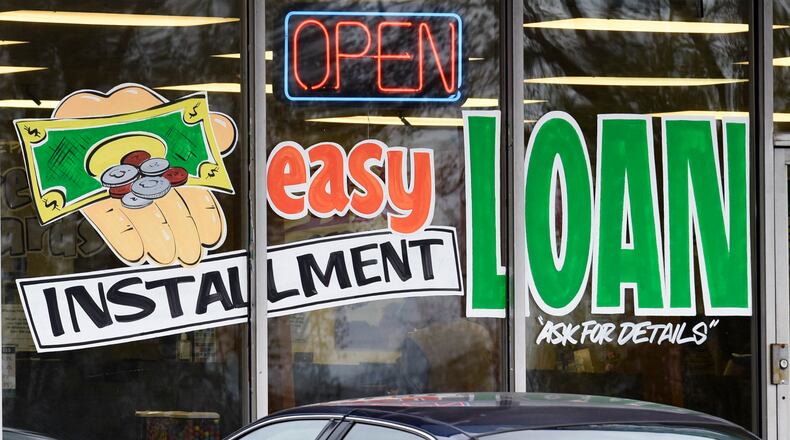Proud to submit payday lending reform ballot initiative petitions with @CarlRuby to the AG today. Reform is a decade past due and the gouging of Ohioans must stop. @ohpaydayreform @OhioCDC pic.twitter.com/Edcb3Imspq
— Nate Coffman (@NateTCoffman) February 28, 2018
Once certified by state officials, the group will need to collect more than 305,000 valid voter signatures by July 4 to qualify for the November 2018 ballot.
FIRST REPORT: Payday loans hurting Springfield, church leaders say
A decade ago Ohio voters endorsed a payday lending law by a 2-to-1 margin that capped annual interest rates and fees at 28 percent. But since then lenders have found ways to sidestep the limits. The result is that some borrowers pay rates of up to 591 percent.
“It’s been a decade and Ohioans are fed up,” said Rev. Carl Ruby of Springfield’s Central Christian Church.
Ruby and Nate Coffman of Ohio CDC, two leaders in the effort, acknowledge that collecting enough signatures will be a heavy lift that will require volunteers and paid staff, significant fund raising and a savvy campaign.
“We are up against power and we’re up against an industry that has a lot of money to spend,” Ruby said. “But we have the moral argument.”
The proposed constitutional amendment mirrors reforms included in House Bill 123, sponsored by state Rep. Kyle Koehler, R-Springfield. Both call for a 28 percent APR cap and limit of monthly fees at $20. The ballot issue would also extend payback time for loans to up to 180 days.
RELATED: Springfield pastor seeking local support for payday lending bill
House Bill 123 was introduced on March 9, 2017.
The Ohio Consumer Lenders Association says the industry abides by existing laws, an industry spokesman has said, and provides a necessary service in many communities by offering credit to customers who often don’t have easy access to traditional banks.
“We remain committed to working with members of the General Assembly and all interested parties on appropriate reforms that do not jeopardize access to credit for the millions of Ohioans we serve,” a statement issued by the Ohio Consumers Lending Association said. “Continued misrepresentations — assertions that they know to be false — are not helpful to achieving any reform.”
Typically with payday loans, consumers borrow $100 to about $1,500 and must pay it back within 30 days, either through a post-dated check or automatic withdrawals. They pay interest and fees that can boost the annual percentage rate above 400 percent. Borrowers who can’t make the full payment when it comes due often extend the loan, accruing more interest and fees.
Pat Crowley, a spokesman for the lenders association, told the News-Sun last year the industry charges fees, not interest rates. Their services help people pay medical bills and buy groceries, or “everyday things that people need to survive,” he has said.
RELATED: Springfield pastor leads effort to put payday loan limits on ballot
One in 10 adults in Ohio, or about 1 million people, have taken out a payday loan, according to a 2016 study by the Pew Charitable Trusts, a national consumer protection organization. The national average is 1 out of every 20 people have used a payday loan, it says.
In 2016, Ruby organized a community forum on payday lending, which included local and state leaders. Springfield has at least at least 18 loan centers, many of which are clustered together in poorer neighborhoods. Ohio has more than 650 storefronts that offer payday loans, the Pew report says.
Koehler understands the group’s frustration with the legislative process but prefers to have HB 123 passed through the legislature rather than a ballot initiative, he said.
“When we put it into the Ohio Revised Code, we can fix it if there’s a problem,” Koehler said. “When something goes into the (Ohio Constitution), we can’t fix it unless we go back to the ballot. They support my effort and I support their effort. My goal is to get House Bill 123 passed.”
Both in-state and out-of-state installment lenders who offer larger loan amounts and have different regulations would like to begin offering payday loans, Koehler said. However, some of the proposed regulations could keep them from Ohio, he said.
Koehler is working on substitute language for the bill that could bring those businesses to Ohio, he said.
“They consider themselves to be upstanding businesses and refuse to operate that way,” Koehler said. “They know there’s a right way to do things and a wrong way to do things. They refuse to open stores in Ohio unless they can do it the right way.”
5 QUICK NEWS-SUN READS
Nonprofit to buy historic Springfield site, market to open in summer
Clark, Champaign counties hit by outbreak linked to parasite, calves
Springfield commission goals include housing study, fixing roads
Should Springfield fluoridate its drinking water?
Study calls for new bike trail, safer park crossing in Clark County
By the numbers
$500 million: Fees charged by the payday and car title loan industry in Ohio per year.
$185 million: Fees charged to Ohio residents by payday loan lenders last year.
650: Estimated storefronts in Ohio that offer payday loans.
SOURCE: 2016 study by the Pew Charitable Trusts
Unmatched coverage
The Springfield News-Sun provides complete coverage of issues that affect jobs and the economy in Springfield, including recent stories on gas prices and store closings at the Upper Valley Mall.


